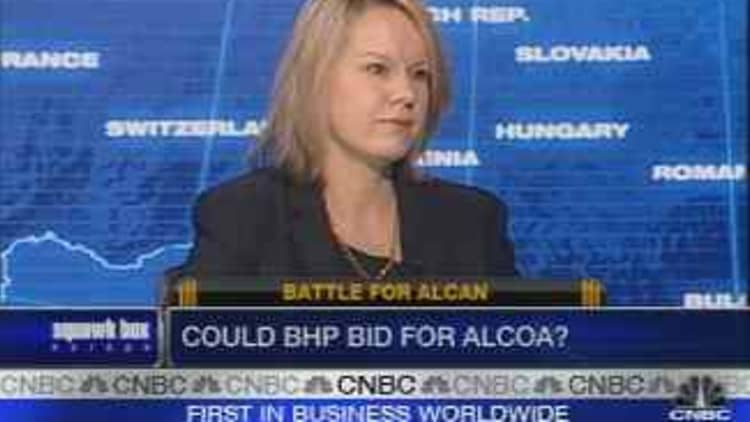BHP Billiton, the world's biggest miner, is in talks with private equity firms to team up for a possible $40 billion bid for U.S. aluminum company Alcoa, London's Times newspaper said on Tuesday.
The report, combined with Alcoa's second-quarter earnings from the night before, kept the company's shares trading in a tight range above and below flatline.
Alcoa also announced after markets closed Tuesday that it extended to August 10 its $28.7 billion hostile offer to buy its Canadian rival Alcan.

The U.K. newspaper, citing unnamed sources close to the company, said BHP's favored partner was the Blackstone Group.
Sources familiar with the matter told Reuters last month that BHP had appointed investment bank Merrill Lynch to work on a possible bid for Alcan.
The Times said Alcoa was BHP's preferred target, but it was unwilling to pay a premium for assets that it does not want to retain and so wanted to team up with a bid partner.
BHP declined to comment.
Alcoa: Sales Rise, Profits Slide
Alcoa started the second-quarter earnings season by reporting a 4% drop in net income, as outages at two of the aluminum maker's U.S. plants eroded profits despite overall second-quarter sales growth.
Alcoa, the first Dow Jones component to report earnings, said Monday that net income for the three months ended June 30 was $715 million, or 81 cents per share, from $744 million, or 85 cents per share, a year ago.
The company recorded charges of $36 million, or 4 cents per share, for outages at its facilities in Alcoa, Tenn., and Rockdale, Texas. In Tennessee, one of the company's production lines -- shut down by a lighting strike in April -- was restarted last month, while the Rockdale smelter's output was slowed to allow for refurbishment due to be finished between October and December.
Pittsburgh-based Alcoa, the world's second-largest aluminum company, saw a restructuring gain of $21 million, or 2 cents per share, mainly from the completion of a joint venture with Sweden's Sapa Group. The new business will include 22 Alcoa soft-alloy extrusion facilities in eight countries. Soft-alloy extrusions are used in industries such as construction and car making.
Alain J.P. Belda, Alcoa's chairman and chief executive, said he had met with shareholders since the May 7 launch of the hostile cash-and-stock bid for Alcan, and that discussions have revolved around synergies, growth opportunities, Alcoa's commitment to Quebec and regulatory approval.
Alcan's board roundly rejected Alcoa's offer, calling it inadequate, and reportedly has entered talks with other potential suitors. Alcan has said it would consider a higher bid or perhaps turn the tables on Alcoa and try to buy it.
"We remain the natural partner for Alcan, with the most substantial synergies and an unparalleled commitment to Canada and Quebec," he said in a statement.
Federal antitrust authorities have sought more information about Alcoa's takeover effort, which was announced after two years of private talks failed to yield a negotiated deal. Alcan said Alcoa has underestimated the regulatory hurdles associated with the proposed combination.
Alcoa and Alcan were the world's top two aluminum producers until March, when Alcoa was eclipsed as the top producer by the Moscow-based United Company Rusal, which was formed through a three-way merger.
Alcoa's quarterly revenue jumped to a record $8.1 billion, up 3.8% from $7.8 billion during the year-ago period. The company attributed the rise to higher volumes and improved product mix.
Its primary metals business suffered from lower prices, the smelter outages and startup costs linked to a new facility in Iceland. Its flat-rolled segment saw robust growth, as did its packaging and consumer division.
Alcoa's earnings matched the expectations of analysts polled by Thomson Financial, who had forecast profit of 81 cents per share on slightly higher sales of $8.3 billion. Alcoa said its revenue figure excluded the soft-alloy joint venture and otherwise would have met analyst projections.
Charles Bradford, an analyst with Bradford Research/Soliel Securities in New York, said he thought Alcoa did reasonably well in the quarter, considering metal prices were down and foreign currency charges were up.
He noted the second quarter was Alcoa's best seasonally and that the company had indicated some of its businesses may weaken in the third quarter.
Belda said the company expects global industry growth of 10% for 2007, with China remaining the primary driver.
For the first half of the year, Alcoa's earnings edged up 2.2% to $1.38 billion, up from $1.35 billion last year.

